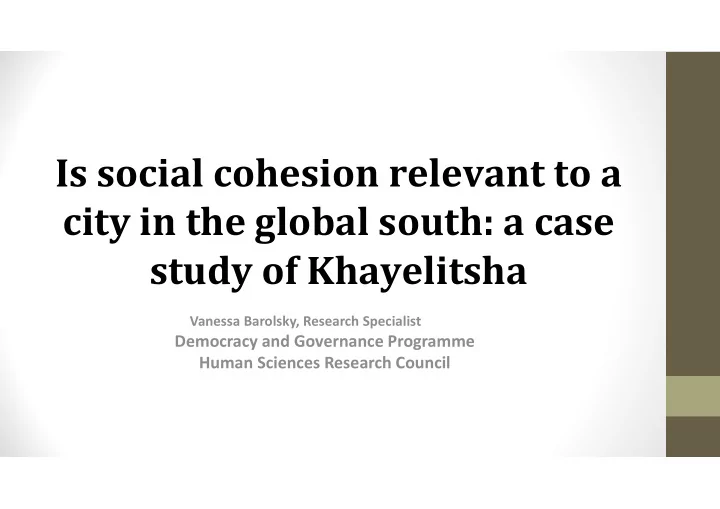

Is social cohesion relevant to a city in the global south: a case study of Khayelitsha Vanessa Barolsky, Research Specialist Democracy and Governance Programme Human Sciences Research Council
Purpose of the research • Engage with the problem of violence and its relationship to social cohesion • Social cohesion – ‘the factors that hold society together’ (SA Presidency) • Characteristics contribute to connectedness and solidarity within democratic societies • Give it “southern” content, critically interrogate it in local and international versions utilising ethnography • Bernard called it a “quasi ‐ concept” 2
Discourses of cohesion • Major part of South African discourse since 2004 (post ‐ apartheid fragmentation) • Significant in international discourse since the 1990s • Diagnosis and solution to fragmentation and diversity of globalisation • Social cohesion linked to violence through concept of collective efficacy in criminological theory • ‘social cohesion among neighbours combined with their willingness to intervene on behalf of the ‘common good’’ (Sampson 1997) 3 • Can ‘protect’ citizens against violence
How relevant is the concept of social cohesion to the global south? • Leading policy and academic work in the global north • Shaped by the historical trajectories, forms of governance and social relations particular to these locations • Positivist orientations: Attempts to quantify this elusive ‘glue’ • Conditions of neighbourhood civility different to middle class sociality imagined by northern scholars (Putnam) • Concerns the very conditions of existence and defense of life • Despite this being incorporated uncritically into policy by countries such as SA • In SA focus on consensus around ‘values’, may undermine the 4 space for democratic pluralism
Khayelitsha: a context for cohesion • Investigated social cohesion in the context of Khayelitsha township in the Western Cape • Conditions in Khayelitsha part of a racialized and segregated urban form created under apartheid but still in place (Gillespie 2014) • Established in 1983 to ‘consolidate’ black settlement in the urban areas of W Cape • High levels of unemployment and poverty (income R2000) • Murder rate above the national average of 31 per 100 000 (between 76 and 108 per 100 000) 5
6
Networks and organisation • Not a ‘decline’ of social solidarity or social networks • Multiple examples of individual and collective acts of solidarity in ethnographic fieldwork My neighbours helped me in each and every step… They stood up for me. They love me and I love them (young orphaned woman) • Numerous forms of informal social organisation • Networks needed to survive poverty and repression • Networks conduits for friendship and support and 7 exclusion and violence
Disputing law • Deeply informal environment • Informal networks ‐ social and symbolic resonance • State envisages social cohesion as based on “civic nationalism” in which the rule and norm of law in the Constitution founds solidarity • Citizens dispute law explicitly and implicitly in numerous daily illegalities • Numerous sites of authority • State law appears deferred, suspended • ‘People of the law’, the police, are seen as contaminated and 8 corrupt
Communitarianism and individualism • Western literature on social cohesion assumes people are highly individualised • Durkheim ‐ with modernity communitarianism replaced by individualism • SA ‐ tension between individualism and communitarianism • ‘individualism is in the head it is not in the blood’ 9 (interviewee)
Mutuality • In Khayelitsha, mutual relations between neighbours appear to be the norm • Not individual actors who ‘choose’ to intervene for the ‘common good’ as in Western contractarian thought • This relation of mutuality is part of people’s identity • Woven into the fabric of social life and social organisation • Implicitly informed by the ethics of Ubuntu • Ethical personhood is realised through the collective 10
The dark side of mutual relations • Indicator of social cohesion ‐ do you recognise strangers in your neighbourhood? • People in Khayelitsha ‘know’ each other but this ‘knowing’ can be a source of violent revenge • Those who are identified as ‘criminals’ may be violently and publically punished • Those who report crime are known to those who commit crime • Relationships between neighbours lead to the violent enforcement of a moral community against the ‘other’ 11
Conclusion • Social cohesion is useful for understanding the social fabric • Can be appropriated for political projects • How to create solidarity in a democratic nation ‐ state? • How to balance unity and pluralism? • Current global thinking limited by assumptions about the nature of social, political and economic life • Needs to be revisited to recognise the social context and practice of subjects outside the ‘north’ • Re ‐ imagine solidarity in new democracies to take into account ethics such as Ubuntu 12 • Recognises the violence and precariousness of life in contexts such as Khayelitsha
Recommend
More recommend